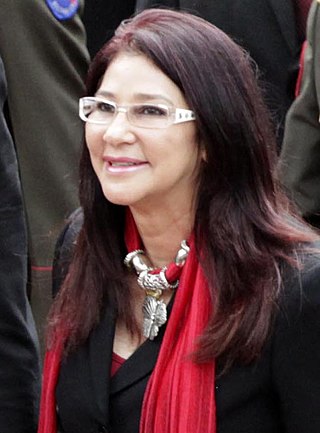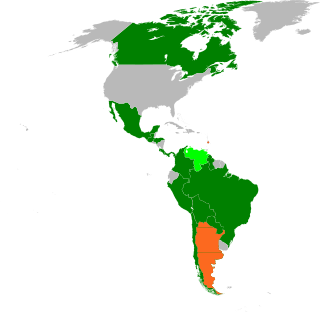Related Research Articles

The Supreme Justice Tribunal is the highest court of law in the Bolivarian Republic of Venezuela and is the head of the judicial branch. As the independence of the Venezuelan judiciary under the regime of Nicolás Maduro is questioned, there have recently been many disputes as to whether this court is legitimate.

Cilia Adela Flores de Maduro is a Venezuelan lawyer and politician. She is married to the President of Venezuela Nicolás Maduro, making her the First Lady. Since 2015, she has also been a deputy in the National Assembly of Venezuela, of which she was president from 2006 to 2011, for her home state of Cojedes. In 2017, the Constituent National Assembly was founded, in which she is a member of the Presidential Commission.

Tibisay Lucena Ramírez was a Venezuelan politician, president of the National Electoral Council (CNE) between 2006 and 2020, one of the five branches of government of Venezuela. Since 2017, Lucena was sanctioned by several countries for her role in undermining democracy and human rights in the country.
Gladys María Gutiérrez Alvarado was the head of the Venezuelan Supreme Court from May 2013 until February 2017.

Presidential elections were held in Venezuela on 20 May 2018, with incumbent Nicolás Maduro being declared re-elected for a second six-year term. The original electoral date was scheduled for December 2018 but was subsequently pulled ahead to 22 April before being pushed back to 20 May. Some analysts described the poll as a sham election, as many prominent opposition parties had been barred from participating in it. The elections had the lowest voter turnout in Venezuela's democratic era.

On 29 March 2017, the Supreme Tribunal of Justice (TSJ) of Venezuela took over legislative powers of the National Assembly. The Tribunal, mainly supporters of President Nicolás Maduro, also restricted the immunity granted to the Assembly's members, who mostly belonged to the opposition.

Constituent Assembly elections were held in Venezuela on 30 July 2017 to elect the members of the 2017 Constituent National Assembly. Unlike the 1999 Constituent National Assembly, which was assembled following a referendum, the 2017 election was convened by the presidential decree of President Nicolás Maduro. Smartmatic, the Venezuelan-owned company which provided the voting machines, stated that the results were tampered with by the CNE, and that the turnout was off by at least one million votes.

The Lima Group is a multilateral body that was established following the Lima Declaration on 8 August 2017 in the Peruvian capital of Lima, where representatives of 12 countries met in order to establish a peaceful exit to the ongoing crisis in Venezuela.
Parliamentary elections were held in Venezuela on 6 December 2020. Aside from the 167 deputies of the National Assembly who are eligible to be re-elected, the new National Electoral Council president announced that the assembly would increase by 110 seats, for a total of 277 deputies to be elected.

Tarek William Saab Halabi is a Venezuelan politician, lawyer and poet. He was a leader of the Fifth Republic Movement (MVR) party founded by Hugo Chávez, President of Venezuela, who publicly called him "The Revolution's Poet". He was the Governor of Anzoátegui from 2004 to 2012, and a member of the Committee for Justice and Truth since 2013. In December 2014, he was elected "People's Defender", or Ombudsman, by the National Assembly for 2014–2021 term. Saab was appointed as President of the Republican Moral Council of Venezuela by the People's Power in 2015. On 5 August 2017, the National Constituent Assembly appointed him as Attorney General in substitution of Luisa Ortega Diaz.

During the crisis in Venezuela, governments of the United States, the European Union (E.U.), Canada, Mexico, Panama and Switzerland applied individual sanctions against people associated with the administration of Nicolás Maduro. The sanctions were in response to repression during the 2014 and the 2017 Venezuelan protests, and activities both during the 2017 Constituent Assembly election and the 2018 presidential election. Sanctions were placed on current and former government officials, including members of the Supreme Tribunal of Justice (TSJ) and the 2017 Constituent National Assembly (ANC), members of the military and security forces, and private individuals accused of being involved in human rights abuses, corruption, degradation in the rule of law and repression of democracy.
Socorro Elizabeth Hernández de Hernández is a Venezuelan rector of the country's National Electoral Council (CNE). Before the 2017 Venezuelan Constituent Assembly elections, she was involved in changes to polling stations.
Sandra Oblitas Ruzza is a Venezuelan public official who has been vice president and rector of the country's National Electoral Council (CNE). She was involved in disruptions during the 2017 Venezuelan Constituent Assembly elections in Venezuela.

Tania Valentina Díaz González is a Venezuelan journalist and politician. She was deputy of the United Socialist Party of Venezuela (PSUV) representing the Capital District and Minister of Communication and Information of Venezuela in 2010, as well as deputy and second vice-president of the National Assembly until 2016. Diaz served as the last first vice president of the 2017 National Constituent Assembly (ANC).
The 2020 Venezuelan National Assembly Delegated Committee election was to be held in the ordinary session of the National Assembly on 5 January, in which 160 deputies were to elect the legislature's board of directors for the year 2020–21: the president, the first and second vice presidents, the secretary and the deputy secretary. It was the last such election of the IV National Assembly.

Luis Eduardo Parra Rivero is a Venezuelan politician who was in a dispute with Juan Guaidó for a year over who was the President of the National Assembly of Venezuela based on a vote on 5 January 2020.

Darío Ramón Vivas Velasco was a Venezuelan politician, member of the 2017 National Constituent Assembly and the Governor of the Capital District.
Elvis Eduardo Hidrobo Amoroso is a Venezuelan politician and lawyer who currently serves as the Comptroller General of Venezuela as of 23 October 2018. He also holds the presidency of the Republican Moral Council, also known as the Moral Power. In August 2017, he was elected as first and second vice president of the 2017 Constituent National Assembly and served until October 2017. He also served as a deputy to the National Assembly for the United Socialist Party of Venezuela (PSUV).

Erika del Valle Farías Peña is a Venezuelan politician. She served as Minister for the Office of the Presidency three times as Minister for Urban Agriculture, Minister for the Communes and deputy to the 2017 National Constituent Assembly. She is a militant and member of the National Directorate of the United Socialist Party of Venezuela (PSUV), and is currently the mayor of the Libertador Bolivarian Municipality of Caracas.

The Democratic Alliance was a political coalition created to face the government of Nicolás Maduro in the 2020 Venezuelan parliamentary election and grouped in the National Assembly. It is made up of Hope for Change, Cambiemos and Progressive Advance parties of the predecessor coalition Agreement for Change, in addition to the intervened parties Democratic Action and Copei, and the later incorporated Primero Venezuela, United Venezuela, Ecological Movement, Unidad Vision Venezuela, Country Commitment and the also intervened Popular Will.
References
- ↑ "Alfonzo Indira Maira - Edo. Miranda - Venezuela". Dateas. 14 June 2020.
- ↑ "Así se juramentaron los "nuevos" rectores del CNE" (in Spanish). El Nacional. 12 June 2020.
- ↑ "Venezuela top court names new electoral council, opposition defiant". Reuters. 13 June 2020. Retrieved 2020-06-15.
- ↑ Alonso, Juan Francisco (28 November 2018). "Magistrada que dejó a Amazonas sin diputados ahora le dio al chavismo la FCU de la UC" (in Spanish). Crónica Uno. Retrieved 29 November 2018.
- 1 2 "Canada to impose sanctions on more Venezuelan officials". VOA News. Reuters. 30 May 2018. Retrieved 4 April 2019.
- ↑ "Regulations amending the Special Economic Measures (Venezuela) Regulations: SOR/2018-114". Canada Gazette, Part II. 152 (12). 30 May 2018. Retrieved 4 April 2019.
- ↑ Trillo, Manuel (30 May 2018). "Canadá impone sanciones a la mujer de Maduro y otros trece cargos del régimen de Venezuela" [Canada imposes sanctions on Maduro's wife and thirteen other charges of the Venezuelan regime]. ABC International (in Spanish). Retrieved 4 April 2019.
- ↑ "Treasury Sanctions Maduro Regime Officials for Undermining Democratic Order in Venezuela". US Department of State (Global Public Affairs). 4 September 2020. Retrieved 6 September 2020.
- ↑ Donmez, Beyza (4 September 2019). "US sanctions Venezuelans heading parliamentary polls". Anadolu Agency . Retrieved 6 September 2019.
- ↑ "COUNCIL IMPLEMENTING REGULATION (EU) 2022/2194 of 10 November 2022 implementing Regulation (EU) 2017/2063 concerning restrictive measures in view of the situation in Venezuela". Official Journal of the European Union.